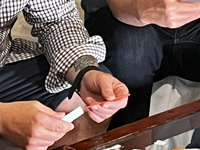Your doctor has told you a thousand times that it's time to cut back on cholesterol. But cholesterol can be a good thing when it's in the skin of a malaria parasite.
Scientists at Drexel University published a study Thursday in the journal PLOS Pathogens which investigated how two different potential antimalarial drugs help kill parasites.
This new knowledge is key in the battle against malaria, which affects up to 300 million people every year. The majority of victims are children under the age of 5 in sub-Saharan Africa.
The scientists knew that the drugs cause a spike in sodium levels in the malaria parasite and kill them. However, they had no idea before that the increase in sodium sets off such a complex domino effect of consequences.
“The mechanism is a lot more complicated and interesting than we originally thought,” said Akhil Vaidya, director of Drexel's Center for Molecular Parasitology, in a statement.
The parasite's skin, known as the plasma membrane, starts swelling with cholesterol until it's too rigid to pass through the narrow channels of the bloodstream. The sodium also sends a signal to the parasite to start the process of cellular division too soon, before it's ready, rendering it inert. Eventually, the whole parasite erupts.
The three drugs that cause sodium spikes in malaria parasites are in the clinical trial stage now, so it's crucial that scientists understand better how the mechanism works.







